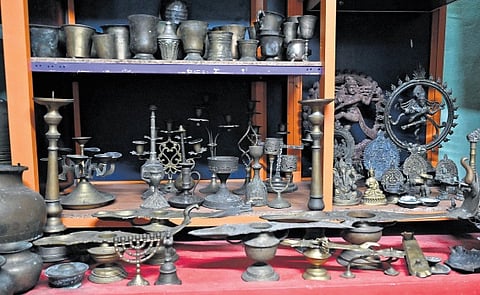

KOCHI: In one corner, there’s a stack of old tax papers, yellowed with age, rare coins, and a gramophone croon tune that once filled the air with romance. In this treasure trove, history is something you can touch, see, and even hear. In the age of minimalism, where sleek, uncluttered spaces reign supreme and ‘less is more’ is a guiding principle, this one person has turned hoarding into an art form.
V J Abey from Neyyattinkara in Thiruvananthapuram had made his home a place where possessions are not just things to be owned but cherished keepsakes that hold within them the time and stories from eras long gone. So, it can be said that the past is very much alive in his home.
It’s not just a room filled with random objects; it’s a carefully curated collection where every item has a pulse, a memory, and a story to tell, no matter how insignificant it might seem to an outsider. Abey’s passion for collecting traces back to his grandfather, C J Issac Vadhyar, who was a teacher with a deep appreciation for history.
Before Issac Vadhyar passed away, he thoughtfully divided his heirlooms among the family, including property, furniture, and various artefacts. As a young boy, with curiosity, Abey took a look at his cupboard and preserved forgotten papers and tax documents dating back to the 1800s.
“My grandfather was a great man. He even wrote an autobiography detailing our family’s history, and he was a passionate collector of artefacts, tax receipts of 100 years, and the deeds his father got from the Travancore king during the 1820-30 time period.
I guess that habit of preserving the past must have found its way to me. One of my cousins went to Israel in the 1980s, and when he came back, he gave me a shekel. This again sparked the interest in me and I realized I wanted to keep expanding my grandfather’s collection,” Abey said.
At 54 years old, Abey has gathered an extraordinary collection that spans 27 varieties of gramophones, natural stones, 270 variety cameras, old hard disks, typewriters, projectors, clocks from different countries, numerous lamps, Greek coins, Roman coins, and even a telescope used on a 1918 ship. His collection also includes cinema reels, cassettes, a variety of radios, tap records, phones, and an assortment of locks like the traditional “Nazhi poottu,” as well as the mould used to make lemon candy, among many other nostalgic objects.
Originally a businessman, Abey finds relief and fulfilment in curating this collection. He relishes the opportunity to share the stories behind each artefact with visitors, explaining their historical significance and personal connections. For him, these items are more than just objects, just gazing at them is a therapy that evokes many memories and nostalgia.
“I travel a lot to find and collect these items. Besides my travels, there’s a community in Thiruvananthapuram called the Philatelic and Numismatic Association. It’s a community for people who share a passion for collecting such things. In these groups, members often exchange items, which provides opportunities for interested collectors to expand their collections.”
Abey says, “Each item has its unique journey before it reaches my hands. I have faced many difficulties in collecting these pieces, whether it’s the travel involved or the stress of sending money to different countries to import them. The tension of waiting for an item to arrive can be quite intense. Maintaining the collection is even harder than acquiring it. Issues like fungus, climate change, and other factors can affect them. Despite these challenges, the satisfaction of preserving and sharing makes it all worthwhile. Initially, my family had problems with this, but they eventually found joy in seeing visitors appreciate and praise the collection.”
During the COVID-19 lockdown, when many people had little to do, Abey found the perfect opportunity to organize his collection. He arranged them in a way that could be showcased to visitors. Since then, people from all walks of life have come to see the collection such as the older people who want to relive memories of their youth, as well as school and college students.
Abey even takes some of his collection to schools for exhibitions. “The inquisitiveness of children is a joy to experience,” he says with a smile. “Unlike adults, they ask questions that stem from their pure curiosity. Apart from covering transportation costs, I don’t charge schools a penny because I truly enjoy the experience of sharing these pieces of history with the younger generation.”
He is now continuing to expand his collection and is planning for a larger space to accommodate his growing trove. As he puts it, “When you acquire an item you never thought you would ever touch, the happiness is simply indescribable.”